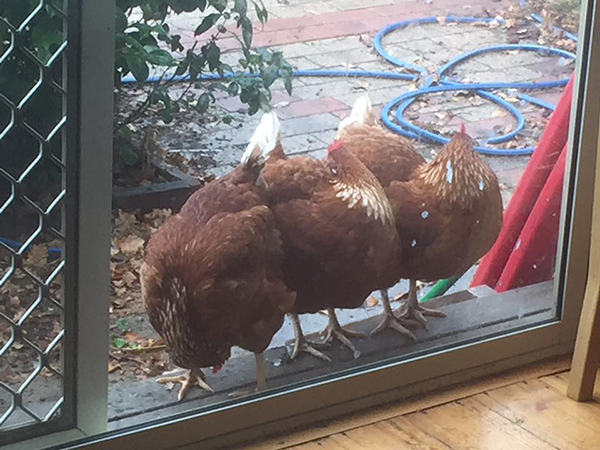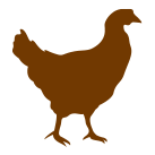National Chook Health Week case study:
Cereal for eggs – a fair breakfast trade
Who: Gregor, Kate, Hamish, Angus and Lewis
Where: Horsham, VIC
When the Heard family first took delivery of six chooks, having them as indoor pets wasn’t part of their thinking.
However, “the girls” – as Gregor, Kate and their three sons call the flock – had other ideas.
“There are certainly no flies on the girls and we soon discovered not to leave the back door open or we’d find them calmly enjoying a bit of a relax on the carpet or under the kitchen table where the boys sit mopping up any crumbs,” Gregor says.

‘Get us out of this foul weather!’
Home invasions aside, the mixed batch of two Isa Browns, two Plymouth Rocks and two Sussexes have settled beautifully into country-town living at Horsham in western Victoria.
They’ve landed doubly on their feet being welcomed into the Heard household, as journalist Gregor’s specialty is the Australian grains industry – a definite plus for wheat- and barley-loving chooks.
“We use poultry mixes to boost egg production,” Gregor says.
“I also raid the hoppers around my brother’s silos at the farm for wheat and barley. We tried oats once and they ate it but didn’t seem to do well.”
The flock does a roaring two-way breakfast trade as well: in return for fresh eggs for the Heards’ table they receive anything not consumed by the three boys.
“One of the best bits about having the chooks is that the thousands of bowls of half-eaten cereal and toast now have a ready home.
“In terms of special treats they seem to foam at the mouth when they get the leftover yabby scraps; it’s a win-win deal because we’re not left with mouldering crustacean shells stinking out the bins.”
Gregor says while all six hens share a coop, the Isa Browns, as the oldest, “have a somewhat superior attitude to the other four”.
“There are no roosters due to council by-laws, although we did have one incident with another Plymouth that was sold as a hen. When it started crowing we realised it may have been somewhat confused and took it back to the breeders.”
Gregor and Kate took delivery of their first hens, the Isa Browns, in early 2016, soon after returning to Horsham after a year of living in Spain.
“We thought it would be nice for the kids to have something to take care of, we wanted some fresh eggs and we also thought it would be a good way to cut down on household waste,” Gregor says.
“It’s been fantastic on that front – all those half-eaten bowls of cereal and things that aren’t fantastic to compost are gladly demolished by the girls.”
While the two Isas arrived at point of lay, the other two breeds took “a considerable time” before producing their first eggs.
With three growing boys to feed, being over-supplied is not something the Heards face.
“Given the Plymouths and Sussexes are both dual-purpose hens and aren’t really prolific layers, we very rarely have more than we can’t handle with a quiche or sponge or two,” Gregor says.
Although Lewis is still a touch too young to take his turn looking after the chooks, both Hamish and Angus are involved in their care.
“The boys like them, although the size of Plymouths means they’re not as keen to pick them up as the little Isas,” Gregor says.

‘Why use a nest box when you can lay on the cold muddy ground?’
“They’re reasonable at lending a hand and love collecting the eggs of course, but I wouldn’t want to put the chooks’ lives in their hands as feeding can be a little sporadic.”
Gregor and Kate carry out a quick daily visual check of their flock’s health and make sure their housing is secure.
“We’re in town, and although urban foxes can be a problem, we’ve been lucky enough not to have had an issue with them,” Gregor says.
“On the other hand, we most definitely have had a problem with crows. The cunning little buggers figured out how to the get the lid off the hen coop and were feasting on eggs.
“The chooks had not been laying over winter so initially we didn’t notice until a weekend when I was sitting on the back couch and caught the crow red-handed.”
He says understanding chook psychology has been somewhat of a challenge.
“The ludicrous creatures have caused their share of headaches in terms of their living arrangements,” Gregor says.
“We have a lovely little wooden hen house and nests which would fit them all perfectly but when the Plymouths came in the Isas wouldn’t share, so we ended up getting a large cat carrier and fitting it with roosts and straw.
“Then when the Sussexes came, they wouldn’t go in with the others, and we had to get another carrier so all three breeds could sleep separately.
“Even with that range of options it was nothing to see the poor old Sussexes sometimes roosting outside in the open on a cold and frosty night or in the rain, but it appears they’ve suffered no ill-effects from their stupidity.”
Read more about National Chook Health Week here.

